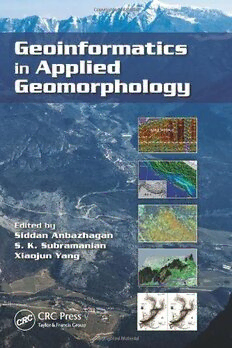Download Geoinformatics in Applied Geomorphology PDF Free - Full Version
Download Geoinformatics in Applied Geomorphology by Siddan Anbazhagan, S.K. Subramanian, XIAOJUN YANG in PDF format completely FREE. No registration required, no payment needed. Get instant access to this valuable resource on PDFdrive.to!
About Geoinformatics in Applied Geomorphology
With recent innovations in the arena of remote sensing and geographic information systems, the use of geoinformatics in applied geomorphology is receiving more attention than ever. Geoinformatics in Applied Geomorphology examines how modern concepts, technologies, and methods in geoinformatics can be used to solve a wide variety of applied geomorphologic problems, such as characterization of arid, coastal, fluvial, aeolian, glacial, karst, and tectonic landforms; natural hazard zoning and mitigations; petroleum exploration; and groundwater exploration and management. Using case studies to illustrate concepts and methods, this book covers: Arid environments, such as the Thar desert, West Texas, the Qatar Peninsula, and the Dead Sea areas Coastal shoreline changes in Kuwait Coastal zone management in India Estuarine bathymetric study of Tampa Bay, Florida Fluvial landforms of the Elbe river basin, Germany Subsurface coastal geomorphology and coastal morphological changes due to tsunamis in the East coast of India The Himalayas, Jammu & Kashmir, Western Ghats, and Precambrian terrain of South India The result of extensive research by an interdisciplinary team of contributors, Geoinformatics in Applied Geomorphology is designed for students, researchers, and professionals in the areas of geomorphology, geological engineering, geography, remote sensing, and geographic information systems.
Detailed Information
| Author: | Siddan Anbazhagan, S.K. Subramanian, XIAOJUN YANG |
|---|---|
| Publication Year: | 2011 |
| ISBN: | 9781439830499 |
| Pages: | 387 |
| Language: | English |
| File Size: | 11.132 |
| Format: | |
| Price: | FREE |
Safe & Secure Download - No registration required
Why Choose PDFdrive for Your Free Geoinformatics in Applied Geomorphology Download?
- 100% Free: No hidden fees or subscriptions required for one book every day.
- No Registration: Immediate access is available without creating accounts for one book every day.
- Safe and Secure: Clean downloads without malware or viruses
- Multiple Formats: PDF, MOBI, Mpub,... optimized for all devices
- Educational Resource: Supporting knowledge sharing and learning
Frequently Asked Questions
Is it really free to download Geoinformatics in Applied Geomorphology PDF?
Yes, on https://PDFdrive.to you can download Geoinformatics in Applied Geomorphology by Siddan Anbazhagan, S.K. Subramanian, XIAOJUN YANG completely free. We don't require any payment, subscription, or registration to access this PDF file. For 3 books every day.
How can I read Geoinformatics in Applied Geomorphology on my mobile device?
After downloading Geoinformatics in Applied Geomorphology PDF, you can open it with any PDF reader app on your phone or tablet. We recommend using Adobe Acrobat Reader, Apple Books, or Google Play Books for the best reading experience.
Is this the full version of Geoinformatics in Applied Geomorphology?
Yes, this is the complete PDF version of Geoinformatics in Applied Geomorphology by Siddan Anbazhagan, S.K. Subramanian, XIAOJUN YANG. You will be able to read the entire content as in the printed version without missing any pages.
Is it legal to download Geoinformatics in Applied Geomorphology PDF for free?
https://PDFdrive.to provides links to free educational resources available online. We do not store any files on our servers. Please be aware of copyright laws in your country before downloading.
The materials shared are intended for research, educational, and personal use in accordance with fair use principles.

